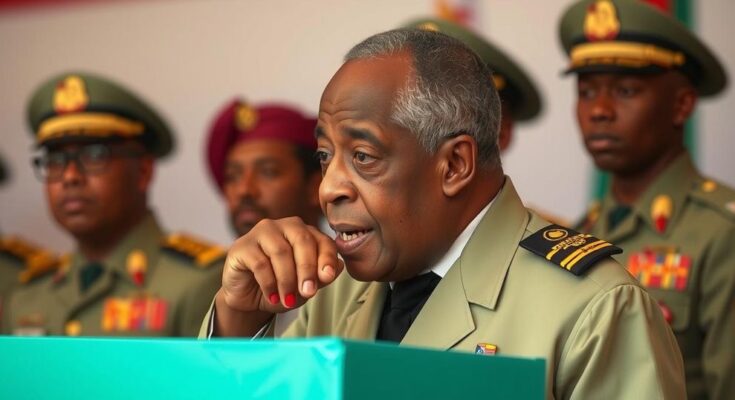Chad held a general election aiming to end military rule, but turnout was low at 38 percent amidst an opposition boycott. Claims of pre-determined results were prominent, with notable disillusionment among citizens. Election legitimacy was questioned due to missing ballots and ongoing security challenges, set against a backdrop of government claims of a transition to democracy.
Chad conducted a general election on Sunday, aimed at ending three years of military rule. The turnout for the election was expected to be low, largely due to a boycott called by opposition parties. Midday reports indicated a turnout of only 38 percent, as many voters heeded the call to abstain from the polls. While government officials attributed the lack of participation to inclement weather, opposition leaders claimed that the election results were pre-determined. Succes Masra, leader of the opposition Transformers party, stated that the majority of voters stayed home in response to their boycott.
The election permits candidates aligned with President Mahamat Idriss Deby Itno, who took power via military means in 2021 and oversaw a contested presidential election in May. Deby urged participation through social media, deeming the day historic. Despite calls for election integrity from opposition figures, skepticism remained, with Masra asserting that the results had already been fabricated. Some voters expressed disillusionment, with one stating that his vote felt meaningless in the context of governmental corruption.
On the other hand, there was a claim of high turnout among military personnel and nomads, suggesting that various community needs were at stake in the elections, especially concerning living conditions affected by climate change. Election integrity issues continued to surface, highlighted by the disappearance of more than a thousand ballots, prompting the Democratic Party of the Chadian People to call for vigilance against fraud. This election occurs amidst security threats posed by Boko Haram and a backdrop of strained foreign relations, particularly concerning France. The government has framed these elections as a critical step in transitioning to democracy.
Chad has faced political unrest and military governance after the death of longstanding President Idriss Deby in 2021. The current military-led administration declared its commitment to transition back to democratic rule, yet opposition parties have consistently challenged the legitimacy of governmental processes, asserting that elections are pre-determined and fraudulent. With a population of eight million registered voters, significant sections have expressed disillusionment with the electoral process, urging citizens to boycott elections they deem non-credible. The context is also complicated by ongoing regional security issues and economic challenges exacerbated by climate change.
The recent general election in Chad has underscored the deep divisions between the ruling military government and opposition forces. While the government touts the elections as a return to democratic norms, significant voter apathy and allegations of pre-determined outcomes raise serious questions about the integrity of the electoral process. With ongoing economic and security issues, the path toward genuine democracy in Chad remains fraught with challenges and skepticism among the populace.
Original Source: www.communitynewspapergroup.com




